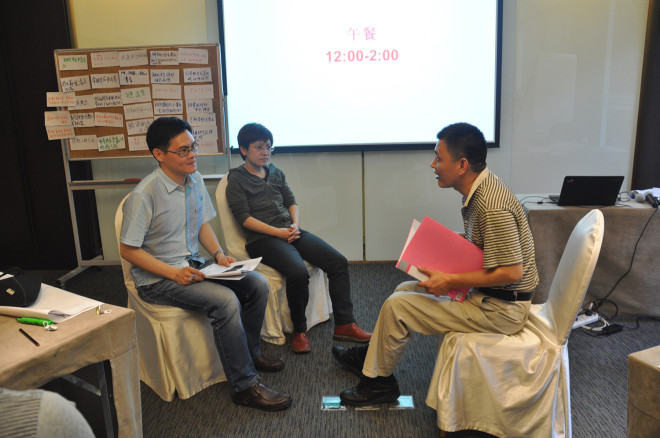In 2003, Trim was volunteering as a moderator of online groups that discuss lesbian and domestic violence issues in China. While sorting through QQ–a popular Chinese messaging service– she found an influx of posts from “lesbians wanting to kill themselves” due to the stigma and discrimination they experienced. Realizing that China needed an organization that focused on issues faced by the lesbian community, she met Xian, a lesbian activist with the goal of establishing such an organization, and Trim joined the founding team.
Established in 2005, Common Language is now China’s leading lesbian, bisexual, and transgender (LBT) rights organization. Through community mobilization, public education, and law and policy advocacy, Common Language focuses on Chinese communities suffering from oppression based on sexual orientation and gender identity and endeavors to educate the general public on sexual diversity issues.
“Common Language is about having the strength to solve issues on a larger level,” says Trim. “If you can change society’s perception of the issues, then you can generate systemic change.” Among the systemic change already generated is increased lesbian activism in China; for example, the total number of lesbian organizations in the Chinese Lala Alliance, a network of lesbian community-based organizations, has grown from zero at the time of Common Language’s inception to over 30 today.
After participating in a one-day workshop with Asia Catalyst in May 2013, Common Language realized the benefits of a strong strategic plan and capacity building, and joined Asia Catalyst’s one-year capacity building program. After each workshop in the series, Trim facilitated internal meetings for Common Language to disseminate lessons learned, and now several of her team members have increased project management and advocacy skills. One of the motivating factors for joining the program was to learn the skills to pass on to other lesbian organizations and, today, Common Language is applying these skills and delivering community trainings of its own.

In August 2014, Common Language conducted a Youth Action Camp. The Youth Action Camp was developed through experience with Asia Catalyst training, and Common Language’s history of holding “Lala Camps” in collaboration with the Lala Alliance, which brought together LBT organizations and individuals from across the country for networking, information sharing, and training. Lala Camps were normally a large and expansive affair, but this year’s Youth Action Camp was re-structured as a smaller seven-day workshop training series for LBT CBOs using AC training methods. 14 people from 4 cities in China attended, with organizers from mainland China, Hong Kong, and Taiwan as facilitators and trainers.
Using Asia Catalyst’s curriculum and training methods, Common Language staff facilitated the week long workshop, with an Asia Catalyst staff member also assisting with several trainings on-site and serving as a mentor for some of the Common Language facilitators. By the end of the week, Common Language cleanly transitioned from student organization in Asia Catalyst’s programs, to independent innovator and implementer of Asia Catalyst’s community-centered curriculum.
As with many of Asia Catalyst’s programs, none of the Youth Action Camp participants had previously done strategic planning as an organization; most did not have government contacts and very few had media and foundation contacts. After the 7-day training, 86% of participants reported being able to make strategic plans, 93% learned the three aspects of organizational vision, and 100% reported that they would be able to use the new skills learned during the training in their work. As one participant put it, “I have never been a meeting facilitator before but I am sure I know how to be one with all the skills I’ve learned.”
This bodes well for the future of China’s LBT community. As a representative from Common Language puts it, Asia Catalyst’s contribution of strategic planning to the Youth Action Camp agenda “really took these organizations from community support groups to bona fide CBOs. Now they are devising projects with their strategic plans in mind, and working towards a clear vision.”
Based on feedback from participants, Common Language now aims to develop a version of Asia Catalyst’s curriculum Know It with case studies and examples specific to the LBQ community. In the grand scheme of things, the organization wants to generate a ripple effect alongside Asia Catalyst, with participant LBT organizations providing support and capacity building to younger and less experienced groups in the region. Following the Youth Leadership Camp, this ripple is beginning, with some participants loosely mentoring organizations in Lanzhou and Hohot. In the meantime, Common Language continues to strengthen its own skills in capacity building training, to provide more in-depth training and skills to the “ripple” organizations, and help them to pass their skills on even further.




